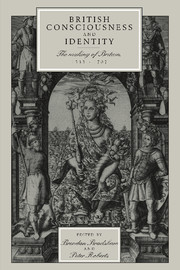Book contents
- Frontmatter
- Contents
- Notes on the contributors
- Preface
- Introduction
- 1 Tudor Wales, national identity and the British inheritance
- 2 The English Reformation and identity formation in Ireland and Wales
- 3 Faith, culture and sovereignty: Irish nationality and its development, 1558–1625
- 4 From English to British literature: John Lyly's Euphues and Edmund Spenser's The Faerie Queen
- 5 The British problem in three tracts on Ireland by Spenser, Bacon and Milton
- 6 James Ussher and the creation of an Irish protestant identity
- 7 Seventeenth-century Wales: definition and identity
- 8 Scottish identity in the seventeenth century
- 9 The Gaidhealtachd and the emergence of the Scottish Highlands
- 10 ‘No remedy more proper’: Anglo-Irish unionism before 1707
- 11 Protestantism, constitutionalism and British identity under the later Stuarts
- Index
7 - Seventeenth-century Wales: definition and identity
Published online by Cambridge University Press: 15 March 2010
- Frontmatter
- Contents
- Notes on the contributors
- Preface
- Introduction
- 1 Tudor Wales, national identity and the British inheritance
- 2 The English Reformation and identity formation in Ireland and Wales
- 3 Faith, culture and sovereignty: Irish nationality and its development, 1558–1625
- 4 From English to British literature: John Lyly's Euphues and Edmund Spenser's The Faerie Queen
- 5 The British problem in three tracts on Ireland by Spenser, Bacon and Milton
- 6 James Ussher and the creation of an Irish protestant identity
- 7 Seventeenth-century Wales: definition and identity
- 8 Scottish identity in the seventeenth century
- 9 The Gaidhealtachd and the emergence of the Scottish Highlands
- 10 ‘No remedy more proper’: Anglo-Irish unionism before 1707
- 11 Protestantism, constitutionalism and British identity under the later Stuarts
- Index
Summary
In the 1580s a remarkable group of Welsh scholars and ecclesiastics produced a number of books that would have a formative influence on Welsh culture. The translation of the bible (1588) was perhaps the most celebrated. However, another work that emerged from this age deserves equal attention. This was the Historie of Cambriay now called Wales … published in 1584 by David Powell, but drawing on the work of several predecessors lay and clerical. This book became the basis of William Wynne's History of Wales (1697) which in turn remained a key text on Welsh history into the present century. The Historie of Cambria did much to establish the notion that Wales was enough of a unity to permit statements of the general kind required to write a ‘national’ history, and many later writers have undertaken comparable surveys. Conversely, English writers tended to avoid discussing Wales precisely because it was felt to be a distinct nation. It is perhaps time to ask whether ‘Wales’ is indeed a suitable unit for historical analysis and whether this is the most appropriate way of approaching the history of Welsh communities.
The national existence or definition of Cambria, now called Wales is clearly important in the light of recent debates about the construction of a ‘new British history’, which would escape from the anglocentrism of past years.
- Type
- Chapter
- Information
- British Consciousness and IdentityThe Making of Britain, 1533–1707, pp. 213 - 235Publisher: Cambridge University PressPrint publication year: 1998
- 3
- Cited by

